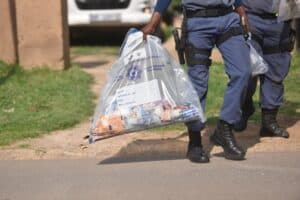Young queer Sowetans challenged perceptions of gay people during pride month.

June is international pride month and young, queer Sowetans want their presence felt and their voices to be heard. At a gathering celebrating pride month, at Meat Lover’s Market in Protea Glen, they came out glammed up, proud of their heritage and confident in their identity.
The theme was all-black, but of course the identifiable rainbow colours were sprinkled across the venue. It was #mood the entire evening with DJs from the LGBTIQA+ community playing pop, amapiano and house hits. There was also live performances for the crowd.
Homophobia in Soweto
On the surface the event is a celebration of pride month and a way to have fun, but beneath that is organiser Sindiswe Tshifaro’s vision to not only allow queer Sowetans to connect, but to create a safe space for them to express themselves without being judged.
“Homophobia continues to exist in the township, even though we don’t hear horror stories anymore. Today there is so much information out there and it’s clear that we are here to stay, so being homophobic is a choice,” she says.

Mpumi Mashawu, an information officer at the Gauteng Department of Health living in Protea Glen, popped in unofficially to let her hair down.
“I jumped to attend because we don’t have enough pride events in Soweto. Being gay in the township is a difficult space to navigate because elderly people are deeply rooted in African culture and religion and still believe in the notion that God created Adam and Eve not Adam and Steve.”
Not for your entertainment
Relebogile Setshedi, from Parents, Families and Friends of South African Queers (Pfsaq), says while queer people are often seen as artistic and outgoing, there are misconceptions that being a young gay South African is trendy. This also feeds the misconception that all gay people are loud and over-the-top.
“It’s important for us to have a voice and an audience to amplify the rights of other queer people, but it’s sad that in the black community queer people are expected to be flamboyant, loud, funny and made to feel like we exist for the entertainment of others if we want to be accepted, or we are only accepted once we have money,” Relebogile says.

“But the reality is that there are a lot of poor gay people in the township who are not flamboyant and they often get ostracised and ridiculed, not only by homophobic people but also gay people who might find them to be embarrassing if they wear cheap colourful wigs and clothing.”
It’s not glamorous
While pride events took place across the country in June with a spirit of fun and celebration, Relebogile is quick to remind that being queer is not glamorous.

“It’s a month of activism. We come home tired from marching in the streets and attending events where we have difficult conversations. We’re also constantly being bullied, especially cyber bullied on social media.”
Pride month anti-gay sentiments
A recent Woolworths campaign that had intended to kick-off international pride month in support of the queer community with branded clothing quickly turned sour when homophobic South Africans called for a boycott of its retail stores.
“As soon as international pride month started, we were already being accused of indoctrinating people, even children because of the pro-gay clothing Woolworths was selling.”

Last year, pride month was met with bomb threats when the country was on high alert of a terrorist attack that would take place in Sandton during a march.
“Celebrating pride month is about empowering queer people to understand their rights and to know they don’t need a law degree to protect themselves. These events are a reminder that we are here to stay and we do it because we have the freedom to and understand how fortunate we are to be openly gay in SA when many of our peers are persecuted for being gay in other African countries.”






